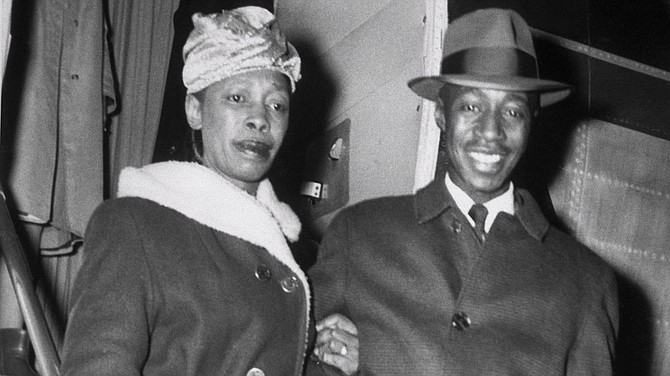The Mississippi Freedom Trail, a series of historical markers established in 2011 to commemorate the 1960s Civil Rights Movement, dedicated a new marker in honor of Clyde Kennard at the University of Southern Mississippi in Hattiesburg on Monday, Feb. 5. Kennard was the first African American student to apply for admission to USM in 1955, when it was called Mississippi Southern College.
Kennard was born on a farm in Hattiesburg on June 12, 1927, and was one of five children. At age 12, he moved to Chicago to live with his older sister, Sara, and attend public school. He graduated from Wendell Phillips High School, after which he enlisted in the U.S. Army and served for seven years. He was deployed in Germany near the end of World War II and later served as a paratrooper during the Korean War.
After his army service, Kennard returned to the U.S. and enrolled at the University of Chicago. During his junior year in 1955, Kennard moved back to Hattiesburg after his stepfather died to help out his mother, Leona Smith. He purchased land in nearby Eatonville and helped Smith run the family farm.
Having already completed nearly three years of a political science major at the University of Chicago, Kennard wished to finish his education while staying close to his mother in Hattiesburg, so he attempted to enroll at nearby Mississippi Southern College later that year. However, the college was still segregated despite the U.S. Supreme Court's 1954 ruling in Brown v. Board of Education, which made segregation unconstitutional.
The school denied his application because he could not supply five references from alumni in his home county, Forrest County. Kennard tried to appeal to college president William D. McCain for assistance, only for McCain to not only deny him but also secretly report Kennard to the Mississippi Sovereignty Commission, a state agency established to preserve segregation and track potential threats to white supremacy.
On Dec. 6, 1958, Kennard wrote a letter to his local newspaper, the Hattiesburg American, in which he announced his intention to enroll again in January and laid out his belief that all individuals should be judged by their ability rather than their skin color. In response, Sovereignty Commission investigators, with former FBI agent Zack J. VanLandingham at the lead, began intensely investigating Kennard to find a way to sabotage his application.
In 1959, when Kennard attempted to enroll again, McCain claimed that he had not submitted a transcript. When Kennard returned to his car, the Commission had police officers arrest him on the Mississippi Southern College campus on false charges of speeding and illegal possession of whisky.
In 1960, he was falsely accused of being an accessory to a burglary at the Forrest County Cooperative, and an all-white jury declared him guilty within 10 minutes at his trial. He was sentenced to the maximum of seven years in prison at the Mississippi State Penitentiary in Parchman. He was diagnosed with cancer at the prison in 1961, but the prison denied him medical treatment. After his condition worsened, supporters and Kennard's mother launched a campaign to get Gov. Ross Barnett to free him on medical grounds. They succeeded in February 1963 despite Barnett refusing to release him a year earlier. Kennard underwent surgeries at Billings Hospital in Chicago but died on July 4, 1963.
USM dedicated Kennard-Washington Hall on campus in 1993 in honor of him and Walter Washington, the first African American to receive a doctorate from the university. The Mississippi Senate and House of Representatives adopted a resolution honoring Kennard in 2006, and former Gov. Haley Barbour declared March 30 as "Clyde Kennard Day," despite refusing to posthumously pardon Kennard. The Forrest County Circuit Court exonerated Kennard later that year following a legal effort that former federal judge Charles Pickering and former Mississippi Gov. William Winter led.
For more information on the Mississippi Freedom Trail, visit visitmississippi.org.
More like this story
More stories by this author
- New CSET Atrium Dedication and College of Business Donation at JSU, MSU ERDC Day
- JSU Commencement Speakers, National Academy of Inventors Chapter and Marc E. Bassy at MSU
- JSU Getty Images Donation, MSU Research Week and Give Wing at USM
- Alumni Enrichment Institutes an MS Got Soul at JSU, State Science Fair at USM
- JSU Blue Tie Gala and Regions Card, MSU Virtual Reality Grant



Comments
Use the comment form below to begin a discussion about this content.
comments powered by Disqus